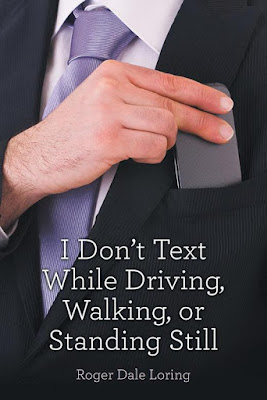Roger
Loring's genius in writing essays that provoke continual
knowing grins combined
with constant affirmative
nods of head and occasional irreverant vocal bursts is matched only
by his market-savvy title selection. That last, the market-savvy
thing, applies only to the two collections of his provocative essays.
For his first collection he chose the title of one of his essays to
lead the pack that would most certainly attract both men and women:
Why Men Don’t Ask for
Directions. I
needn't explain, need I? Okay, I will, but by simply asking you to
picture the heads of every woman you know nodding vigorously as their
voices utter sounds like "oh yeah" and "ego" and
"so what excuse is this guy gonna give?" etc. They bought a
copy, read enough of it to feel good about themselves and the men
they know, and bought more copies for the men. Men bought it to see
what kind of lame-ass excuse this Loring guy had for something all
men have done naturally for ever because they are men. And they, too,
laughed, read all of the essays, and felt good about themselves.
Now
comes Loring's second collection, which I've just finished
reading—grinning, laughing, nodding, etc.--and now feel good, not
necessarily just about myself, but good. Again, Loring picked the
perfect cross-gendered title from among the more
than two dozen available essay titles, and this one also has a
generational attraction. From a marketing point of view, I cannot in
my wildest imagination picture a woman or man born within a few years
after World War II, now dubbed "Baby Boomers," not grinning
and nodding affirmatively when seeing on the cover of a book, I Don't Text While Driving, Walking, or Standing Still. Full
disclosure:
I sure as hell did! And I didn't have to hunt down the table of
contents to find the eponymous essay. It sits right at the top. I
read it, but I didn't have to to be able to divine the answer to the
implied question, which has nothing to do with safety or a preference
for hearing voices to reading esoteric symbols on a tiny screen. The
correct answer is that Roger Loring hasn't learned how to text, and
has no desire to do so. Moreover, he doesn't own a "smart phone"
and has no desire to upgrade from his "flip" phone because
all he wants a cell phone for is to "make phone calls!"
Loring
continues in this essay to confess that he's so unskilled vis a vis
the digitalized information superhighway
"I am still stuck in my garage, because I haven’t figured out
how to work the remote control for my automatic garage door opener."
Now,
youngsters
(younger than
the Boomer generation)
who find
this book lying on a coffee table or in the waiting area of the
garage while their vehicle's being inspected might feel their lips
curl into a smirk or even a sneer at the title. Here's what Loring,
who optimistically believes they might pick the book up and start
reading, advises in his introduction to I Don't Text:
"I...hope younger folks—the Gen X and millennial crowds—will
read the book with an open mind, which was the opposite of my mind
when I was their age."
The
more I think about it, I Don't Text
is indeed the perfect marketing title compared with the other couple
dozen or so heading the essays precisely because
it reaches out, with a certain perverse reverse psychology, to those
youngsters who still read books when not forced to do so for school.
Consider some
of the other titles: The
Difference Between Men and Women. Can
you imagine any youngsters old
enough or
bold enough to watch "adult" TV shows and
movies featuring
interaction between the principle genders not
believing they know everything there is to know about le
difference? To
be seen reading a book with that title would subject them to shaming
condescension from their peers, whose dismayed faces would tacitly
diss them with, "Like, you don't already know, dude?" [Disclosure: I learned some things, and I also know
attitudes of political correctness would best be suspended in the
interest of enjoying the satiric ironies Loring dishes out, tongue
planted firmly in cheek while composing the piece, no doubt.]
Or
this one:
The Hardest Part-Time Job
in America. I mean, what
kid would feel compelled to dare to open the cover of a book that
promised to remind him or her, or some hybrid combination of the two,
that one day, probably sooner than later, they would have to consider
actually finding a job? Any job? But you Boomers most likely do
want to know which part-time job is the hardest in America. Right now
that's for me to know...you know the rest. [Click the boldface title at the top of the page, which will link you to Loring's Amazon.com author's page, if you
wish to buy the book and find out. For those of you digitally
challenged Boomers not completely comfortable with the scrolling
thingy, here's the link again:
RogerLoring's Amazon.com author's page.
Now, the essays in this book
cover a wide range of topics and offer opinions gained from decades
of wisdom-rending experience, many of them spent spent on golf
courses, watching sports on TV, and teaching high school yout's in
Gloucester, Virginia. Did I just write "yout's?" Yeah,
yout's. [Apologies. My Cousin Vinnie is one of my alltime
favorite movies, next to Holmes & Watson and The Big
Lebowski, and I know this isn't about me, and I don't how that
happened to slip out like that but I'm wondering if maybe I Don't
Text's outrageous essays didn't somehow open up a door in my
psyche better left closed at a time like this, but...okay, I'm done.]
One of I Don't Text's most gut-splitting-hilarious essays is
on the clichés used by TV announcers covering sports. After giving
us pages of examples he combines many of the worst lines into this
one compact paragraph:
I am bothered by sports
clichés used on TV broadcasts, but I’m not exactly sure what to do
about it. The fact of the matter is that the ball is in my court.
Instead of just complaining, I need to step up to the plate. I have a
great work ethic, so I need to generate some offense, because I know
what it takes to win. I need to give 110 percent. I’ll leave it all
on the field, because it is clearly time to play hardball. At the end
of the day, I should just take one game at a time and then—turn
down the volume! Okay, I used a few clichés there, but turning down
the volume does seem to be the best solution.
And then there's golf. Golf,
I'm pretty sure, is the main reason Roger Loring wrote this book.
Golf is a serious matter with Roger, and his essay on it, while
giving us some of his usual thigh-thumping insights, also some
serious—deadly serious, as other serious golfers might agree (I'm
not one)--complaints. But first, I must note that I Don't Text also
contains some poetry. Here is one of several shorties known as
haikus:
up in the gray sky
geese begin a long journey
without
GPS.
Now then, back to golf. The
title of this essay signals its theme, and it's not a pretty one:
I’m Gonna Tell. What really irks him [I've finally just now
fulfilled a lifelong dream of being able to write the word "irk"
in a sentence. Sorry again. No more interruptions!], what really irks
Roger Loring is knowing that many many people who watch golfing
tournaments on TV are more interested in catching the pros violate
one of the game's myriad rules than in admiring the brilliance of
their golfing skills. "These people apparently are willing to
devote hours and hours of their time—it takes a professional golfer
between five and six hours to complete a round—just to be the
person who happens to catch a pro illegally ground his or her club in
a sand trap or possibly take an illegal drop after declaring an
unplayable lie...'I think his ball moved on his downswing! He better
give himself a penalty! I’m gonna tell!'” And tell they do, he
says, noting that the PGA not only accepts calls from these
couch-potato snitches, they have a special number to receive the
snitching.
"It never would have
occurred to me that the number for the PGA Office of Squealers and
Busybodies Reporting Possible Rules Infractions would be on
anyone’s speed dial, or better yet, that such an office even
existed," he grumbles.
Loring
cites two reasons for this:
there are way too many rules, and because there aren't enough
officials monitoring the tournaments and,
because pro golfers are presumed to be honorable, the
players are expected to report their own infractions. His
advice:
"The PGA needs to bring this [snitching] to an abrupt halt. Just
let the golfers play the game as brilliantly as most of the pros do,
and let the 'I’m gonna tell' folks go outside and play with the
kids in the neighborhood. If someone misbehaves there, then they can
go inside and tattle to their heart’s content."
I
haven't played golf in years, in part because I was a lousy golfer. I
probly even cheated a time or two and certainly lost my temper and
broke a club or two. I have no desire to return to the links--ever
again, but I agree with Roger, this snitching bullshit has got to be
stopped!



This does sound like fun, Mathew. I am sure I would enjoy the essays. Sometimes I wish I did text, because I would keep in better touch with my brother and sister.
ReplyDeleteMy daughter's generation prefers ONLY to text. They seem to be afraid to hear each other's voices from a cell phone.
DeleteMy kids only text too. You are certainly a wonderful writer, Matthew. Reading your reviews is as good as reading the books you review.
ReplyDeleteI'm honored, Patti. (I'm actually blushing, but that's just between you and moi)
Delete